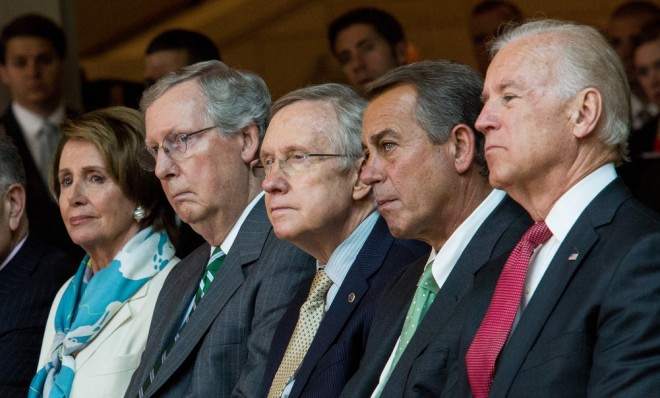Would Congress approve an attack on Syria?
A bipartisan group of lawmakers is demanding that Obama ask Congress for permission before bombing Syria. What happens if they get their wish?


A free daily email with the biggest news stories of the day – and the best features from TheWeek.com
You are now subscribed
Your newsletter sign-up was successful
As President Obama lays out his case for possible retaliatory strikes on Syria for its alleged use of chemical weapons on its citizens, Congress is getting antsy. On Wednesday evening, a group of 98 House Republicans and 18 House Democrats sent Obama a letter "strongly" urging him to "consult and receive authorization from Congress before ordering the use of U.S. military force in Syria."
Presidents haven't been very eager to do that in recent decades, and that includes Obama. He didn't get prior approval from Congress to launch airstrikes into Libya in 2011, for example.
Officials from the White House, the State Department, and the Pentagon are scheduled to brief congressional leaders and the top members of relevant national security committees on Thursday about the situation in Syria. That might assuage some concerns of House Speaker John Boehner, who asked in a letter Wednesday for merely "substantive consultation" with Congress. Boehner also wants Obama to "personally make the case to the American people and Congress for how potential military action will secure American national security interests" and comport with "the exclusive authority of congressional authorization under Article I of the Constitution."
The Week
Escape your echo chamber. Get the facts behind the news, plus analysis from multiple perspectives.

Sign up for The Week's Free Newsletters
From our morning news briefing to a weekly Good News Newsletter, get the best of The Week delivered directly to your inbox.
From our morning news briefing to a weekly Good News Newsletter, get the best of The Week delivered directly to your inbox.
But a growing number of lawmakers want an actual vote, and the 116 House signatories are even offering to return to Washington before the Sept. 9 end of Congress' August recess to "share the burden of decisions made regarding U.S. involvement in the quickly escalating Syrian conflict." What they don't say, though, is how they'd vote.
Some observers predict that Congress wouldn't say no to military action in Syria. Sure, says Ed Morrissey at Hot Air, there are members from both parties opposed to even a small-scale strike, but "there is at least as large a bipartisan group urging action, probably more than enough in both chambers to get easy passage of a limited" strike.
That's a pretty big "probably." Military strikes on Syria aren't very popular among the war-weary U.S. public. And as British Prime Minister David Cameron learned Wednesday, getting legislative approval isn't a slam dunk.
Facing unexpected opposition from Parliament, Cameron put off (probably until next week) a vote on authorizing British military action in Syria. The opposition Labour Party, and even some within Cameron's own governing coalition, had demanded that Britain wait until United Nations weapons inspectors reported their findings on Syria's chemical weapons usage.
A free daily email with the biggest news stories of the day – and the best features from TheWeek.com
Britain's extended deliberation probably puts the brakes on an imminent attack by the U.S., too, says Joshua Keating at Slate.
It would be hard to imagine the White House ordering strikes without the support of the British — in essence going into battle without even the Bush administration's coalition of the willing on board. But it also seems like it will only get harder for the Obama administration to sell the moral and legal case for this operation the farther we get from last week's atrocities. Today's events at Westminster are also a reminder of why Congress isn't going to be asked for its input on Syria any time soon. [Slate]
Even if he doesn't legally need to get approval from Congress — an open question — Obama would be daft not to take his case to our gridlocked legislature, says James Fallows at The Atlantic. "Completely apart from the procedural nicety of involving the rest of the government in authorizing the use of force, he has a compelling political interest in spreading the responsibility for this decision."
Even if Obama has already made up his mind to launch a strike, and even if that operation goes perfectly, something about it will go wrong. Messages will get blurred and bungled; the fog of war will interfere; innocents will be killed....
Therefore it should be 100 percent in his interest to share responsibility for the decision before it is solely his. As Charlie Stevenson points out, the Brits don't have to do this, but the Cameron government is bringing it to a vote. Of course that works more easily in a parliamentary system, where he can rely on a disciplined majority, than in our current dysfunctional mess. But it makes sense in any democracy, even ours. [Atlantic]
Peter has worked as a news and culture writer and editor at The Week since the site's launch in 2008. He covers politics, world affairs, religion and cultural currents. His journalism career began as a copy editor at a financial newswire and has included editorial positions at The New York Times Magazine, Facts on File, and Oregon State University.
